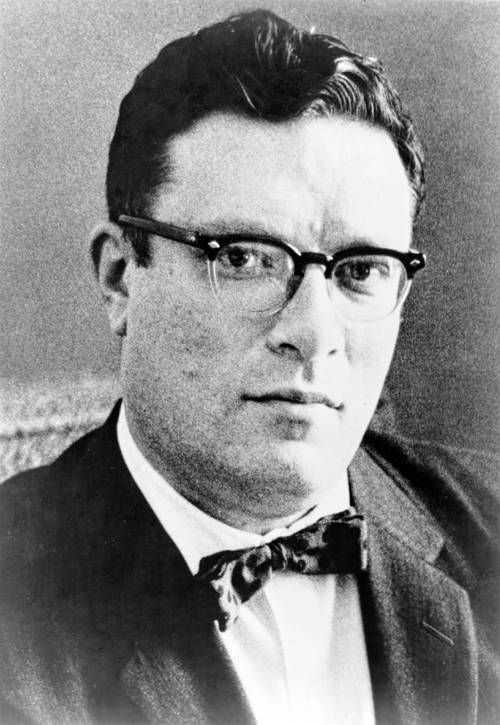
FAQ About Isaac Asimov

Who was Isaac Asimov?
Isaac Asimov was a renowned science fiction writer and biochemist, known for his extensive contributions to literature and science. Born on January 2, 1920, in Petrovichi, Russia, he immigrated with his family to the United States and became a citizen. Asimov is best known for his science fiction series such as the "Foundation" series and the "Robot" series, as well as his wide array of popular science books and essays.

What is Isaac Asimov famous for?
Isaac Asimov is most famous for his science fiction novels and series, including the "Foundation" series, "Robot" series, and "Galactic Empire" series. He is also well-known for his non-fiction works which cover a wide range of subjects including science, history, and literature, helping to popularize complex scientific ideas for general audiences.

What are some of Isaac Asimov's notable works?
Some of Isaac Asimov's notable science fiction works include the "Foundation" series, "I, Robot," and the "Empire" series. In the realm of non-fiction, works such as "The Intelligent Man's Guide to Science" and "Asimov's Guide to the Bible" are some of his recognized contributions.

Did Isaac Asimov develop any scientific theories?
While Isaac Asimov was a biochemist by training, he is not credited with developing any major scientific theories. However, he played a significant role in making science accessible to the public through his clear, engaging writing style in numerous non-fiction books and essays.

What are the Three Laws of Robotics that Isaac Asimov created?
Isaac Asimov formulated the Three Laws of Robotics as a fictional set of ethical guidelines integrated into robots. They are: 1) A robot may not injure a human being or, through inaction, allow a human being to come to harm. 2) A robot must obey the orders given it by human beings, except where such orders would conflict with the First Law. 3) A robot must protect its own existence as long as such protection does not conflict with the First or Second Law.

How did Isaac Asimov influence science fiction?
Isaac Asimov significantly shaped the science fiction genre through his pioneering ideas, particularly regarding robotics and future societies. His works often emphasize rationality and ethics, setting a standard for thoughtful, speculative fiction. Asimov's integrated story arcs across multiple books paved the way for epic science fiction narratives that are still emulated today.

When did Isaac Asimov pass away?
Isaac Asimov passed away on April 6, 1992, in New York City, USA, due to complications from an HIV infection he had contracted from a blood transfusion during heart surgery in 1983.

Did Isaac Asimov have any educational background in science?
Yes, Isaac Asimov possessed a strong educational background in science. He earned a Bachelor of Science degree in Chemistry from Columbia University in 1939, followed by a Master's degree in Chemistry in 1941, and a Ph.D. in Biochemistry in 1948.

How many books did Isaac Asimov write?
Isaac Asimov was extremely prolific, publishing close to 500 books during his lifetime. His works span numerous fields, including science fiction, popular science, history, and essays.

Where can I start with Isaac Asimov's works?
If you are new to Isaac Asimov's works, a good starting point might be his "Foundation" series, which is highly acclaimed and accessible to beginners. For those interested in robotics and artificial intelligence, "I, Robot" provides a fascinating exploration of these themes. His non-fiction works, like "The Intelligent Man's Guide to Science," offer insights into his scientific perspective.

Are there any movies based on Isaac Asimov's books?
Yes, several films have been inspired by Isaac Asimov's writings. "I, Robot" (2004), starring Will Smith, is one of the most well-known adaptations, although it takes substantial creative liberties. "Bicentennial Man" (1999), based on Asimov's novelette of the same name and his novel "The Positronic Man," is another film adaptation.

Was Isaac Asimov involved in any organizations or societies?
Isaac Asimov was an active member of several organizations, including the American Humanist Association, where he served as President. He was also part of the American Association for the Advancement of Science (AAAS) and the National Writers Union, which reflects his deep commitment to both science and literature.

What legacy did Isaac Asimov leave behind?
Isaac Asimov left behind a rich legacy as a master storyteller in the science fiction genre and as an educator in popular science. His "Foundation" series and "Three Laws of Robotics" have inspired countless authors, scientists, and filmmakers. His non-fiction works have contributed significantly to public understanding of science and history. The Asimov estate continues to manage his extensive body of work, maintaining his influence in both the literary and scientific communities.

What awards did Isaac Asimov receive during his career?
Isaac Asimov received numerous awards for his contributions to literature and science fiction, including Hugo and Nebula Awards for his fiction. He also received honorary doctorates and was named a Grand Master by the Science Fiction Writers of America, acknowledging his lasting impact on the genre.

Did Isaac Asimov write under any pseudonyms?
Yes, Isaac Asimov occasionally wrote under pseudonyms. One of his most well-known pseudonyms was "Paul French," under which he wrote the "Lucky Starr" series, a set of science fiction books aimed at younger audiences.

Did Isaac Asimov collaborate with other authors?
Isaac Asimov occasionally collaborated with other authors, most notably with Robert Silverberg, with whom he co-authored the novel "Nightfall." He also worked with other writers in anthologies and collections, contributing essays and stories.

Where was Isaac Asimov born?
Isaac Asimov was born in Petrovichi, a small village in the Smolensk region of Russia, on January 2, 1920. His family immigrated to the United States when he was three years old, eventually settling in Brooklyn, New York.

Did Isaac Asimov win any formal education awards?
While Isaac Asimov's formal education awards are not as prominently spotlighted as his literary accolades, he did receive numerous honorary doctorates from multiple institutions in recognition of his contributions to science and literature.

How did Isaac Asimov's work impact the scientific community?
Although Isaac Asimov was not primarily a scientific innovator, his work greatly impacted the scientific community by bridging the gap between science and the general public. His ability to simplify and elucidate complex scientific ideas in an engaging manner helped demystify science and inspire generations of readers to pursue scientific knowledge.

What themes are common in Isaac Asimov's works?
Common themes in Isaac Asimov's works include the ethical implications of science and technology, the development and impact of artificial intelligence, the future of human society, and the space exploration. His books often explore the tension between human morality and technological advancement, emphasizing logical thought and rational problem-solving.
